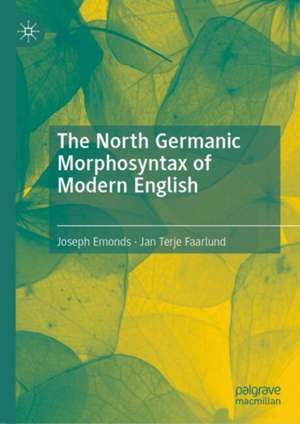The North Germanic Morphosyntax of Modern English
Autor Joseph Emonds, Jan Terje Faarlunden Limba Engleză Hardback – 5 sep 2024
Preț: 729.23 lei
Preț vechi: 889.30 lei
-18% Nou
Puncte Express: 1094
Preț estimativ în valută:
139.55€ • 151.54$ • 117.23£
139.55€ • 151.54$ • 117.23£
Carte tipărită la comandă
Livrare economică 22 aprilie-06 mai
Preluare comenzi: 021 569.72.76
Specificații
ISBN-13: 9783031641664
ISBN-10: 3031641663
Pagini: 216
Ilustrații: Approx. 215 p. 5 illus.
Dimensiuni: 148 x 210 mm
Greutate: 0.49 kg
Ediția:2024
Editura: Springer Nature Switzerland
Colecția Palgrave Macmillan
Locul publicării:Cham, Switzerland
ISBN-10: 3031641663
Pagini: 216
Ilustrații: Approx. 215 p. 5 illus.
Dimensiuni: 148 x 210 mm
Greutate: 0.49 kg
Ediția:2024
Editura: Springer Nature Switzerland
Colecția Palgrave Macmillan
Locul publicării:Cham, Switzerland
Cuprins
Chapter One: The Germanic Language Family in England.- Chapter Two: The Middle English Lexicon: Cultural Integration Creates Anglicized Norse.- Chapter Three: Norse Properties of Middle English Lacking in Old English.- Chapter Four: Split Infinitives and the Category of to.- Chapter Five: Morphosyntactic Properties of Old English Lacking in Old Scandinavian and Middle English.- Chapter Six: Innovations Shared between English and Mainland Scandinavian.- Chapter Seven: The Hybrid Grammatical Lexicon of Middle English.- Chapter Eight: The Sparse Inflection of Middle and Modern English.- Chapter Nine: Phonological Indicators of a Norse Source for Middle English.- Chapter Ten: The Immigrants’ Language Lives On.
Notă biografică
Joseph Emonds is Professor of English at Palacky University, Czechia. He has previously held teaching and research posts in the USA, France, the Netherlands, the UK, Japan, Austria and Spain. His publications focus on topics including generative grammar, syntax, phonology, and language change.
Jan Terje Faarlund is Emeritus Professor of Scandinavian Languages at the University of Oslo, Norway. His main fields of research are syntactic theory and change. He is elected member of The Philological Society, The Norwegian Academy of Science and Letters, and the Royal Norwegian Society of Science and Letters.
Jan Terje Faarlund is Emeritus Professor of Scandinavian Languages at the University of Oslo, Norway. His main fields of research are syntactic theory and change. He is elected member of The Philological Society, The Norwegian Academy of Science and Letters, and the Royal Norwegian Society of Science and Letters.
Textul de pe ultima copertă
This book argues that Middle English - and hence Modern English - is a direct descendent of Anglo Norse, the language of Viking settlers who invaded and ruled the north and east of England (the so-called Danelaw) for about 200 years preceding the Norman conquest. The authors challenge the widely accepted assumption that Middle English descends from Anglo-Saxon. Presenting over 20 arguments in morphology and syntax, they show that the patterns found in standard history of English sources derive from the North Germanic Scandinavian languages. The book shows that, while Danes ruled all England (1013-1066), their Anglo-Norse, lexically but not grammatically close to Anglo-Saxon, superseded the latter throughout England. Sentential word order, modern phrasal verbs, stranded prepositions, and standard regular noun plurals, phonetic z, and split infinitives became Norse hallmarks that persist to this day, while numerous indications of West Germanic (German-style) grammar disappeared entirely. As Anglo-Norse became Middle English, it absorbed much vocabulary from the Anglo-Saxons. This book suggests that in the Middle English German-sourced vocabulary, eliminating borrowed Romance, purely Anglo-Saxon vocabulary may have been double that of purely Norse origin. However, language history is not determined by its vocabulary; what counts is rather a language’s syntax, and the authors posit that this is what makes Modern English Scandinavian. This book will be of interest to scholars of Linguistics, Indo-European Studies, and English Language and Literature, particularly those studying the historical linguistic development of Germanic languages, as well as syntax more broadly.
Joseph Emonds is Professor of English at Palacky University, Czechia. He has previously held teaching and research posts in the USA, France, the Netherlands, the UK, Japan, Austria and Spain. His publications focus on topics including generative grammar, syntax, phonology, and language change.
Jan Terje Faarlund is Emeritus Professor of Scandinavian Languages at the University of Oslo, Norway. His main fields of research are syntactic theory and change. He is elected member of The Philological Society, The Norwegian Academy of Science and Letters, and the Royal Norwegian Society of Science and Letters.
Joseph Emonds is Professor of English at Palacky University, Czechia. He has previously held teaching and research posts in the USA, France, the Netherlands, the UK, Japan, Austria and Spain. His publications focus on topics including generative grammar, syntax, phonology, and language change.
Jan Terje Faarlund is Emeritus Professor of Scandinavian Languages at the University of Oslo, Norway. His main fields of research are syntactic theory and change. He is elected member of The Philological Society, The Norwegian Academy of Science and Letters, and the Royal Norwegian Society of Science and Letters.
Caracteristici
Argues that the linguistic ancestor of Middle English is North Germanic, rather than Old English Draws on analysis of properties such as word order, particles, participles and case inflections Promotes the idea that English history is an integral part of the main lines of European historical development
